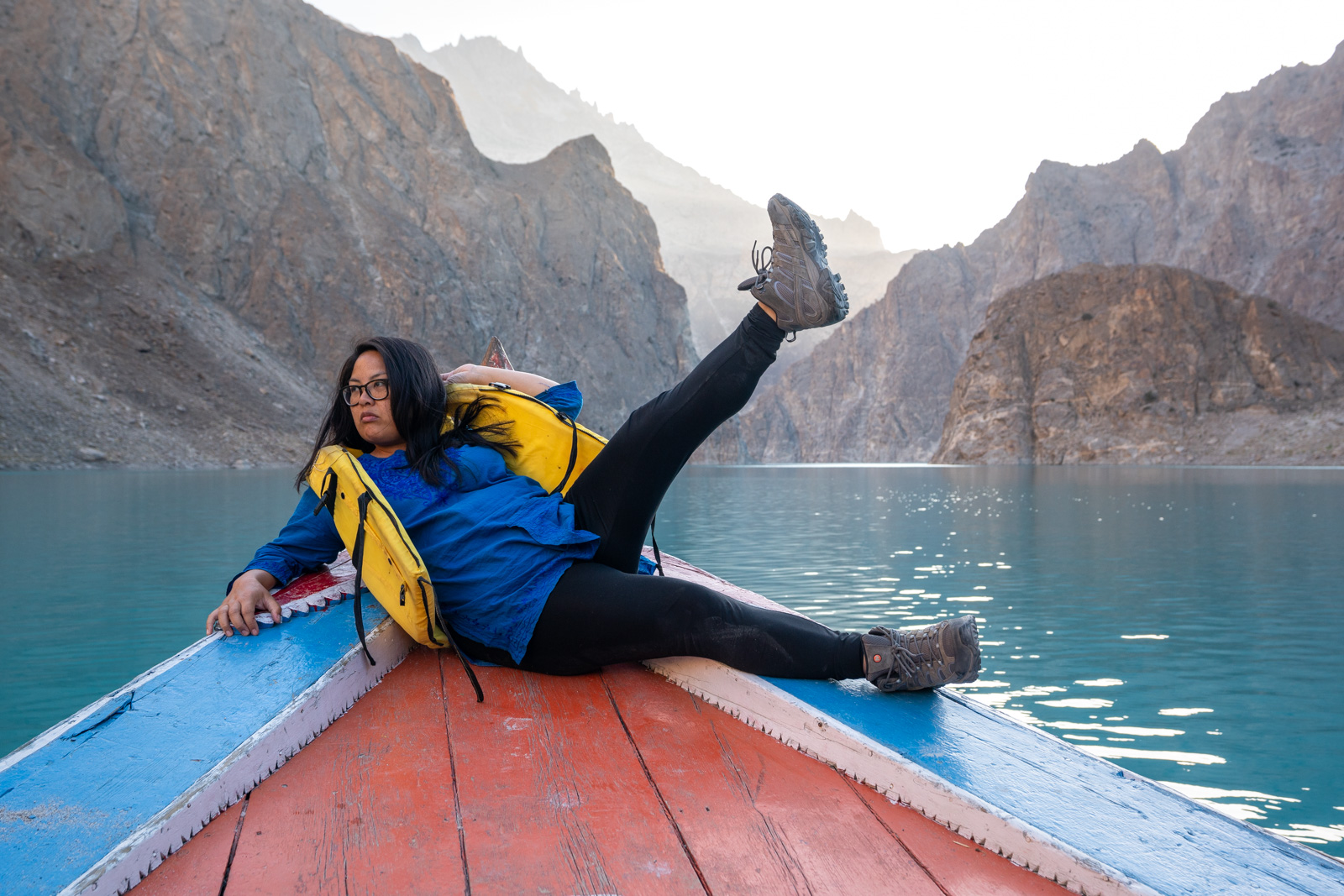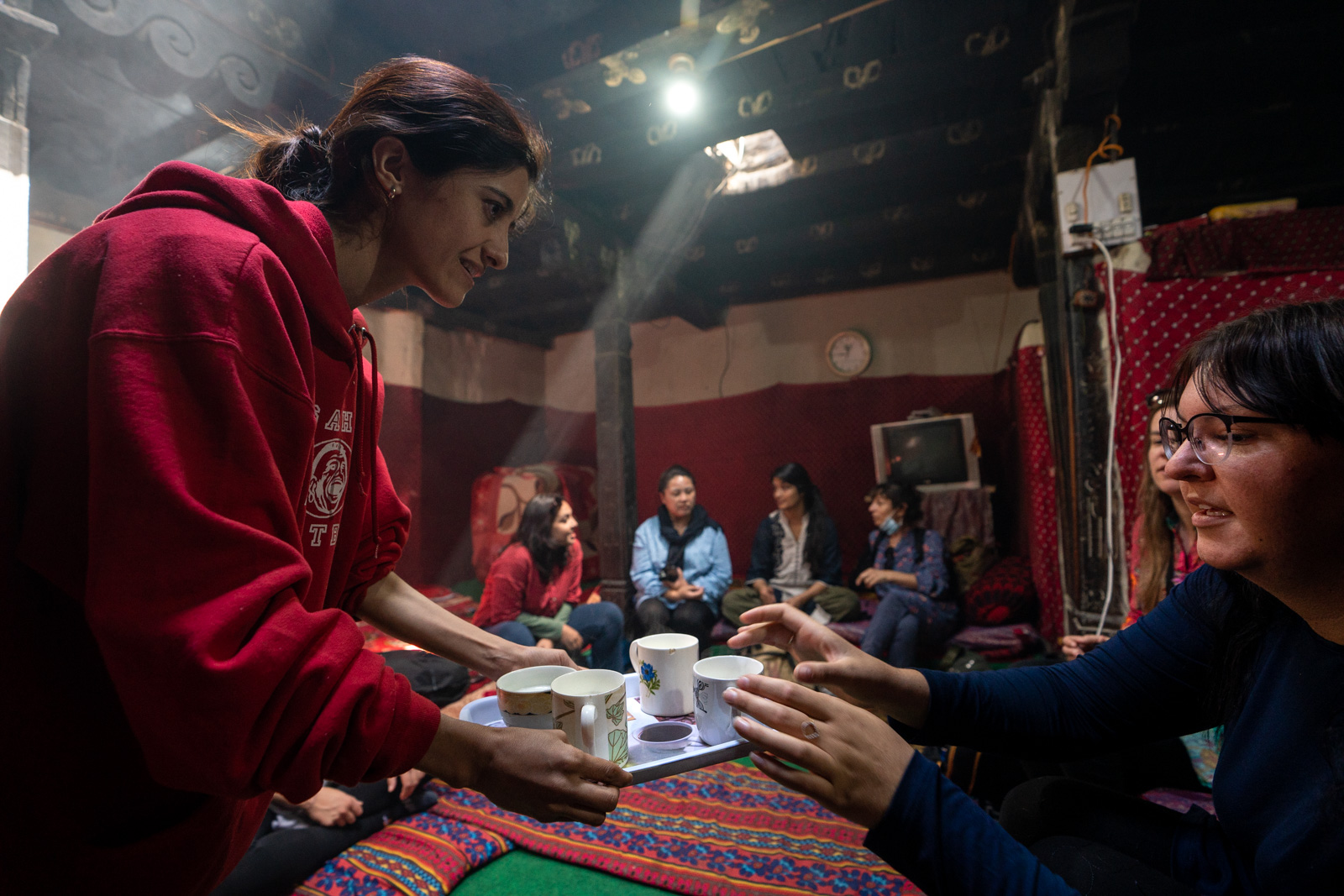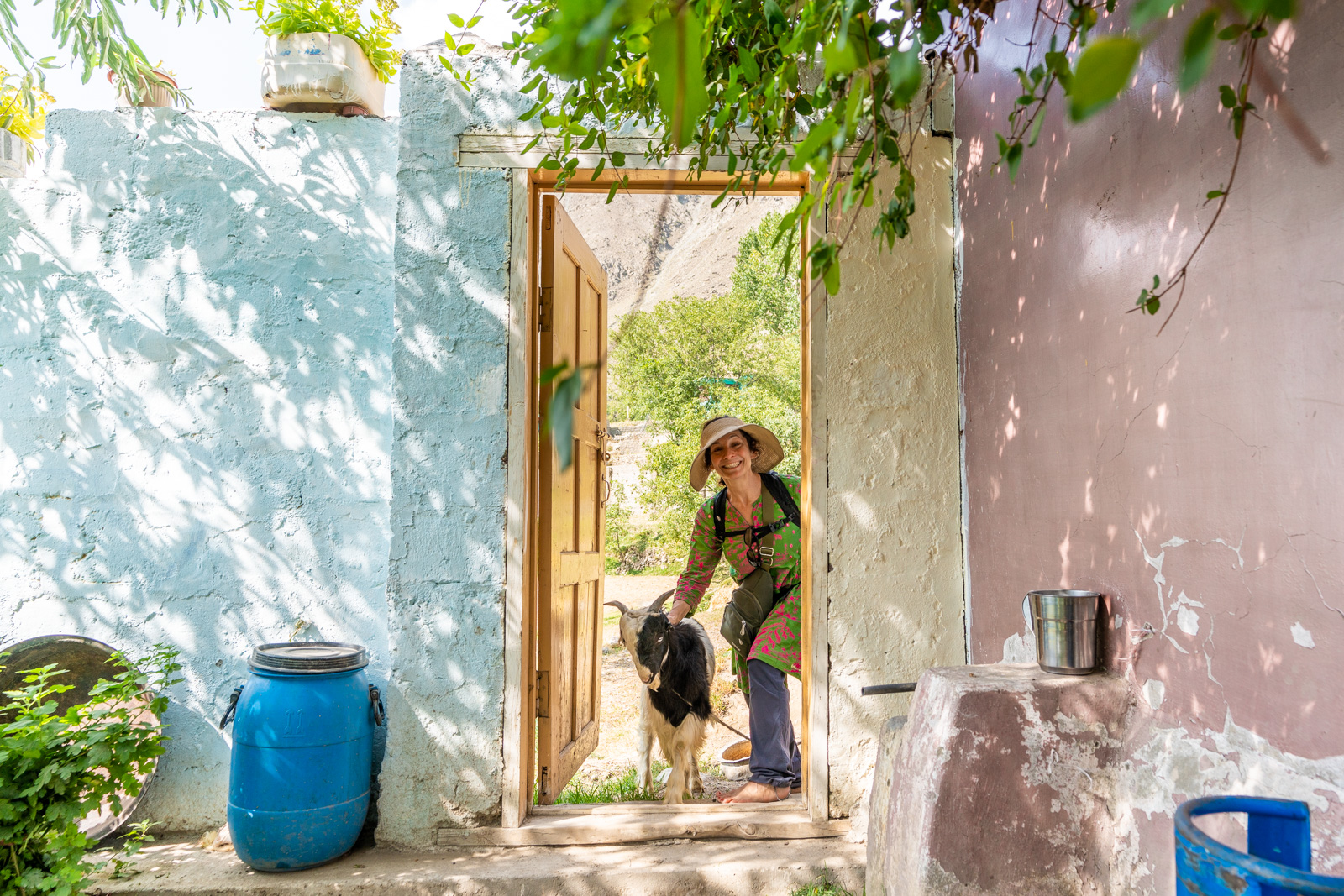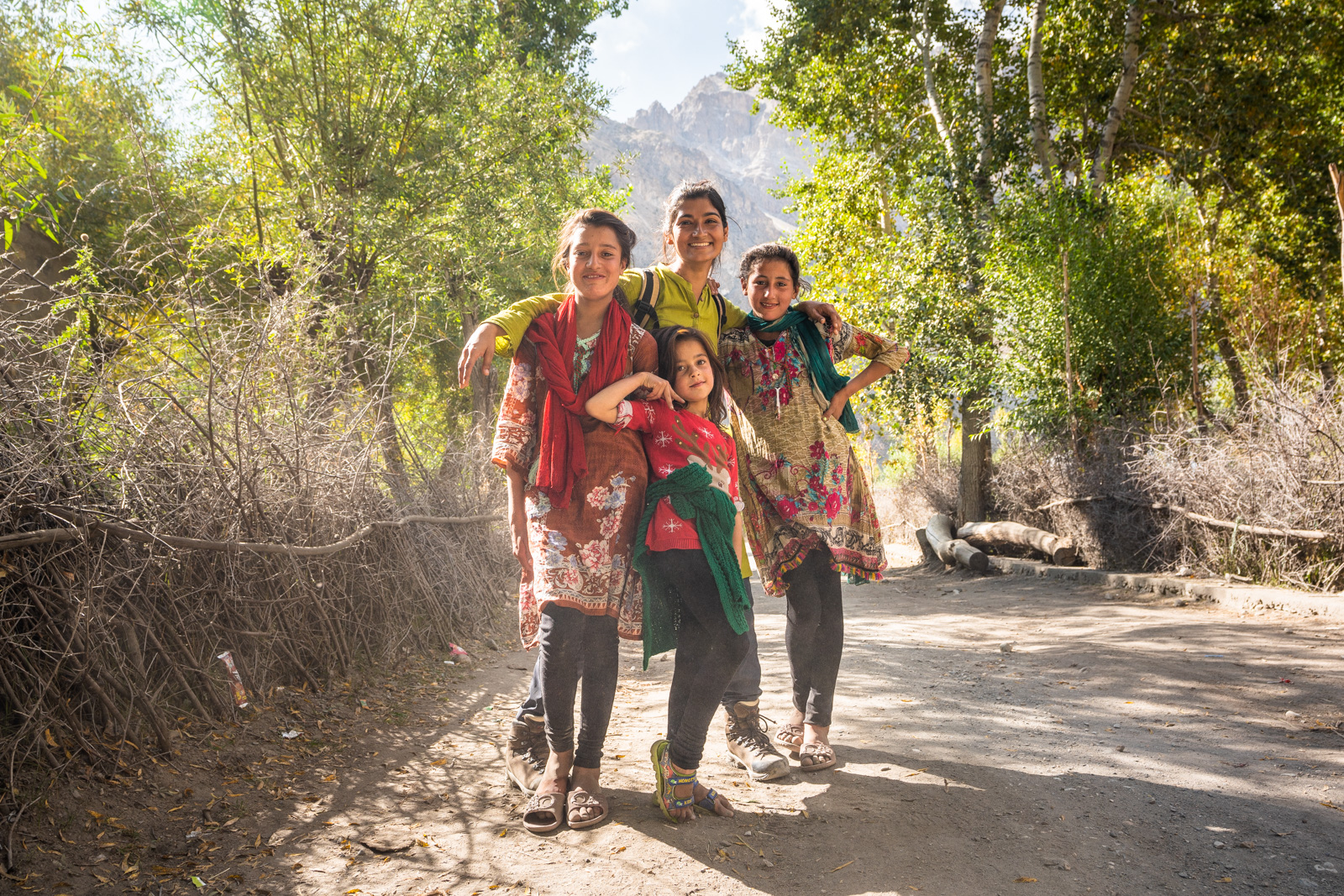For Women by Women
TourS
Overview - Female Tour Guide
We’ve timed the tour to align with trees changing colors in the mountains. Peak travel season will be over, but many foreign groups come to see fall in the mountains. Fall is also the end of harvest season, so you’ll get to taste local apples, walnuts, etc. It’ll be getting cold, especially toward the end of the trip, and we may see some snow at higher altitudes.
Is Pakistan safe to travel as a woman? Yes it is. We specialize in solo female travel and women only tours. Considering joining our Pakistan women’s tour? Book a Spot Now!
Elevation
4693-m. Sleeping at maximum elevation of 2,900-m
Weather
Lahore and Islamabad can be warm (up to 20-30°C), while mountains will be cold (sometimes 10-15°C during the day and below freezing at night). Pack warm layers.
Locations
Islamabad, Astore, Hunza, Ghizer, Lahore
Activities
Cultural activities, Community engagement, Sightseeing, Beginner level day treks (optional)
Trip Level
Adventure (3/5), Culture (4/5), Comfort (2/5), Fitness (3/5)
Accommodation
We will be staying at hotels, guesthouses, and traditional homestays. You’ll have to share double rooms in hotels and guesthouses. In homestays we sometimes have to share one common sleeping space (how local people sleep).
Transport
We will be traveling in a private van and use private jeeps to reach some locations.
Meals
We will be eating local cuisines from all the areas that we visit. Breakfast, lunch, and dinner is included in the package.
A warm smile as someone invites you in for chai. Kebabs sizzling while the call to prayer sings from mosque minarets. Sunrises blanketing snowy mountains in gold. Swapping stories from the comfort of pillows ‘round a warm stove in the evening.
These are moments that made us fall in love with Pakistan. We want to share them with you.
This won’t be your typical tour de Pakistan. We’re not squeezing in as much as humanly possible, rushing you from spot to spot, nor showing you a polished version. You’ll be fully immersed in Pakistan: traditional homes, offbeat locations, local food and guides, treks with nary a soul in sight.
Rich and poor, urban and rural, liberal and conservative: our solo and female travel groups’ tours will show you the diversity that makes Pakistan what it is. And then some.
“This trip truly and honestly changed my life.”
Turfah, Canada
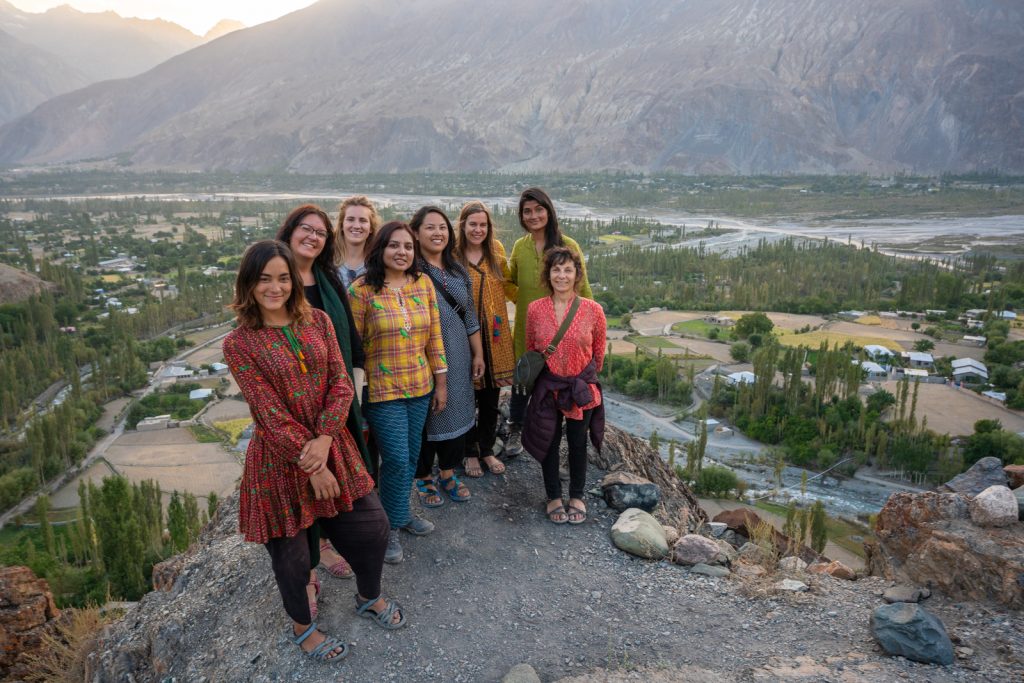
Locations
We’ll be heading to both famous sights and off the beaten track locales, including but not limited to:
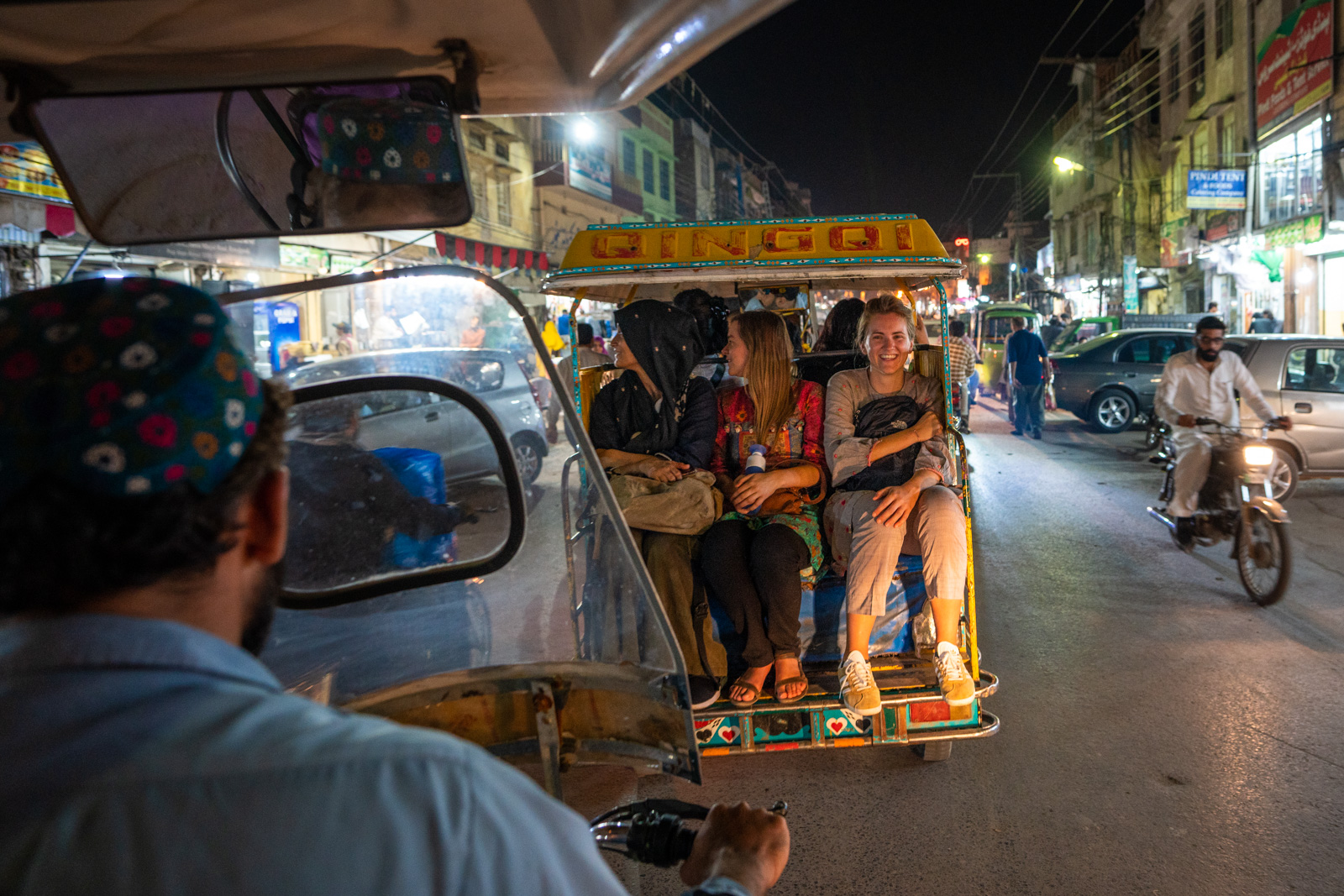
Islamabad, Rawalpindi
Our tour begins in Pakistan’s peaceful capital, with a visit to its far older and slightly more chaotic neighboring city, Rawalpindi.
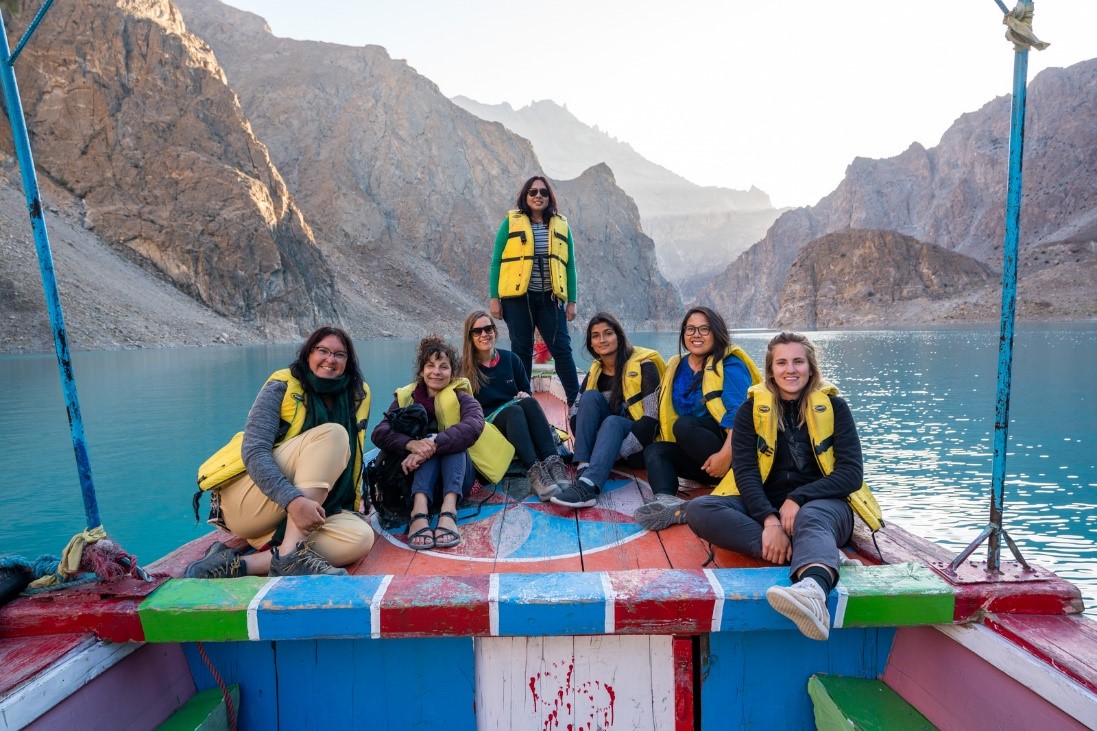
Hunza – Gulmit, Passu, Karimabad, Altit
Pakistan’s most famous valley, embraced by the Karakoram Mountains and filled with crackling glaciers, forested foothills, and ancient fortresses. We’ll travel along the famous Karakoram Highway to visit multiple locations in Hunza, and stay in a traditional homestay.
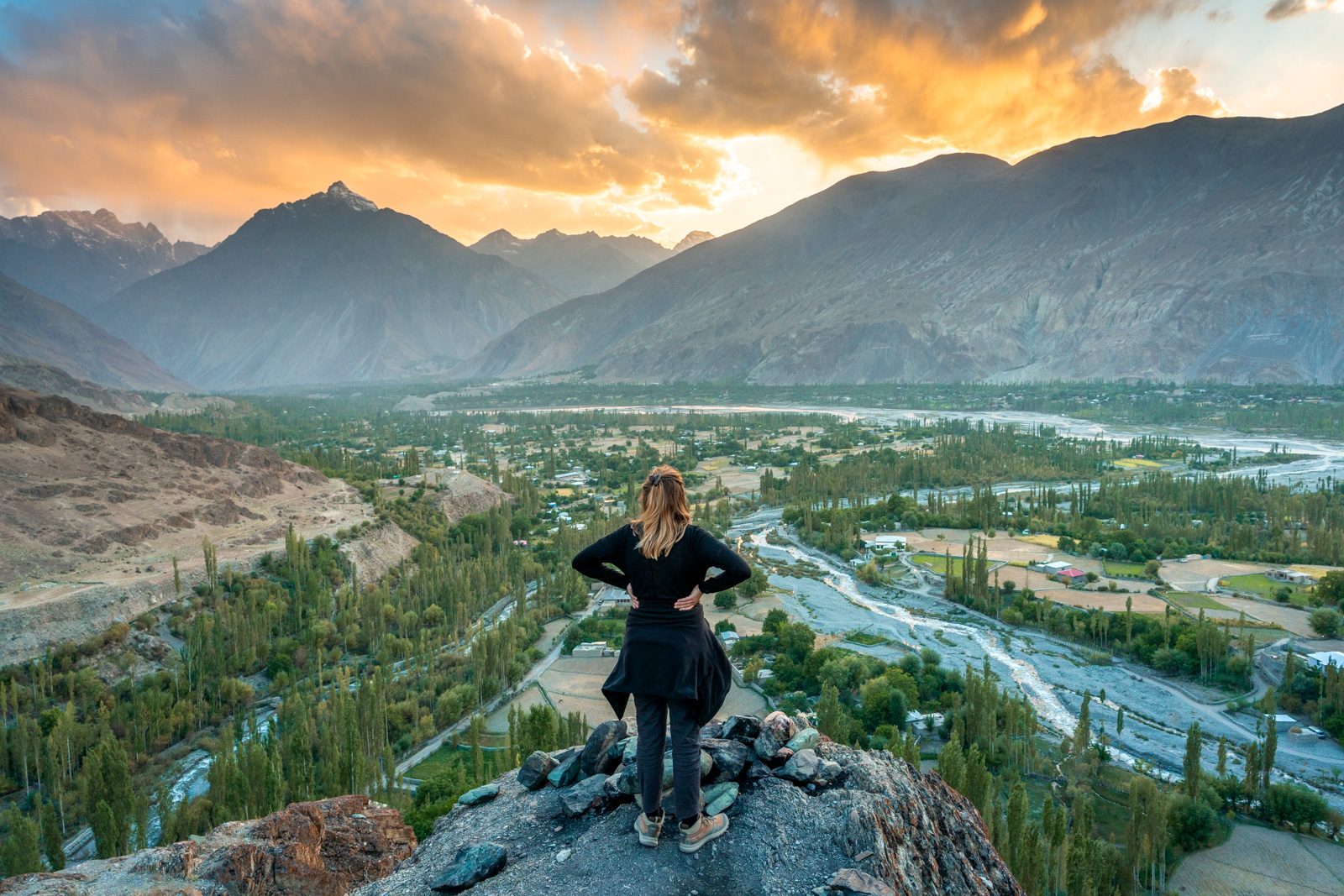
Ghizer – Taus
A quiet and little-visited region in western Gilgit Baltistan, where we’ll find intimate mountain valleys and some of the most hospitable people in the north. Idyllic Yasin Valley will be our focus, and we’ll stay at two different homestays while there.
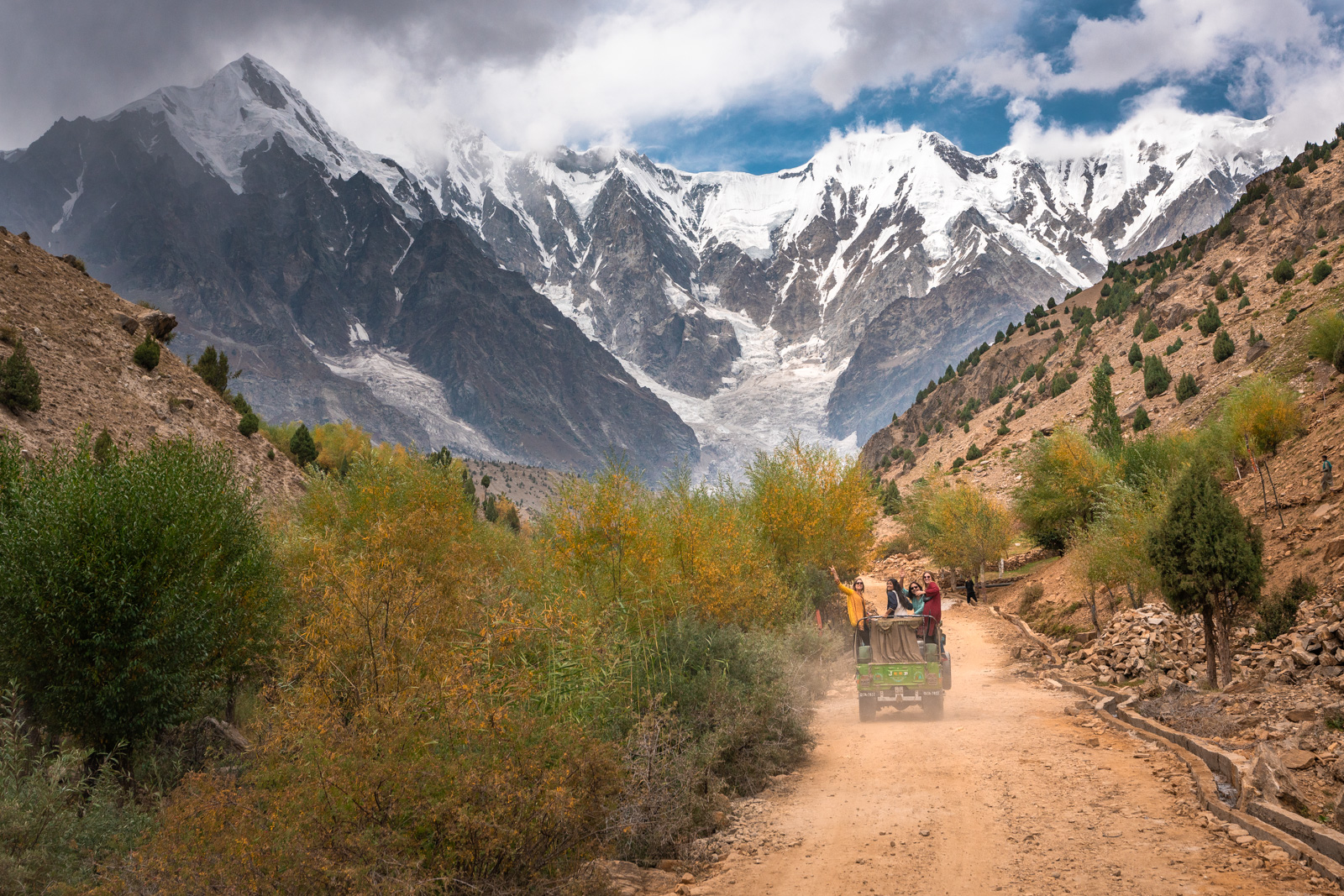
Astore – Tarishing, Rama
Out with the dry mountains, in with the green meadows! Pastoral postcard views, aquamarine lakes, and the ninth highest mountain in the world await us in this region east of the Karakoram Highway.
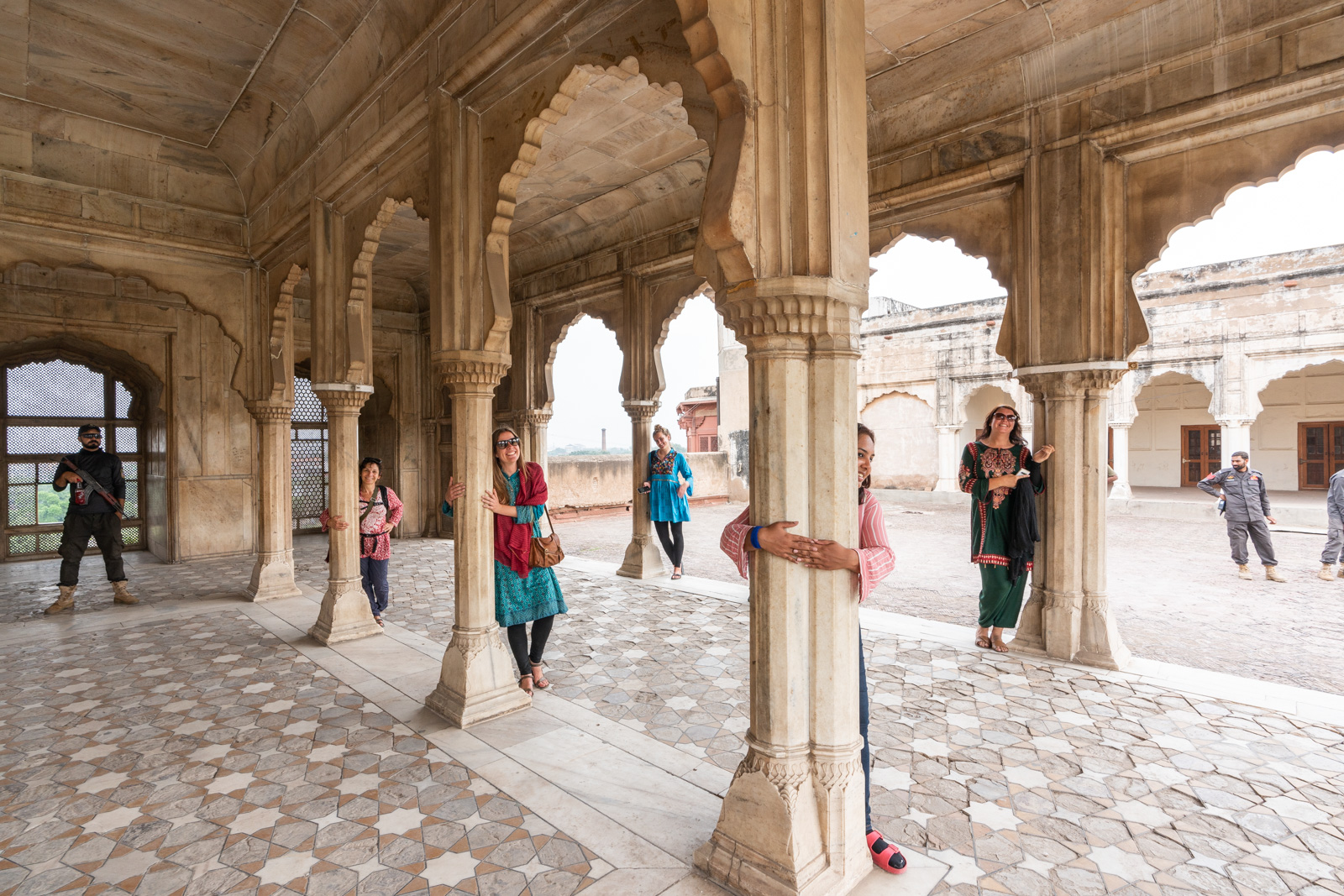
Lahore
Pakistan’s cultural capital is our grand finale! Mughal-era monuments, religious shrines still very much alive, a passionate food scene and more await in this historic city, our favorite in Pakistan.
Detailed Itinerary
Considering joining our Pakistan women only tour? Here’s our full Pakistan women’s tour itinerary to help you decide.
Anything is possible in Pakistan. This is our planned itinerary… but things don’t always go according to plan! From chai invites to landslides, delays can happen anywhere; flexibility is key.
Think of this itinerary as a guideline rather than an exact schedule. If we have to make changes on the fly, we’ll still try to do everything mentioned.
Overview:
Our tour kicks off to a start in Pakistan’s calm capital. Straight roads, less traffic, and leafy tree coverage make your first day a gentle one. You’ll be jet lagged most likely, so we’ll take it easy.
Activities:
- Meet up and introduction
- Shopping for shalwar kameez (local clothes)
- Visit Shah Allah Ditta caves
- Golra Railway Station
- Faisal Mosque
- Travel time: 1-2 hours
- Max Altitude: 540 metres
- Activities: sightseeing, shopping
- Accommodation: Islamabad hotel
- Transport: private van
- Meals: breakfast, lunch and dinner
Note: If possible, it’s useful to arrive a day or two early to get acclimated to the time change and rest up before the tour begins.
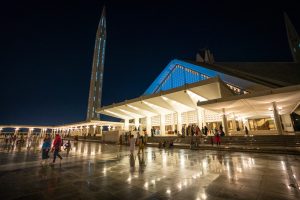
Overview:
Time to venture out of Islamabad and see… Buddhist history?!
Yep, Buddhism was widespread in the region before Islam’s introduction. UNESCO-listed Taxila is one of the country’s biggest Buddhist sites, spanning hundreds of square kilometers. We’ll visit the museum to peep at their vast collection of Buddhist relics, then head out to poke around in a few of the major archaeological sites.
In the evening, we’ll head to Islamabad’s little-visited neighbor city: Rawalpindi. Far older than Islamabad (and much less planned), Rawalpindi is a proper Pakistani city. While dodging traffic and ignoring inevitable stares, we’ll roam around Rawalpindi’s bazaars and admire old architecture.
Risk takers can snack on street food. We’ll finish off our evening with dinner in a famous Rawalpindi restaurant (safer for the stomach than street food).
Activities:
- Taxila, UNESCO Buddhist sites more than 1,000 years old
- Walk through old city of Rawalpindi
- Travel time: 2-3 hours
- Max Altitude: 550 metres
- Activities: sightseeing
- Accommodation: Islamabad hotel
- Transport: private van
- Meals: breakfast, lunch and dinner
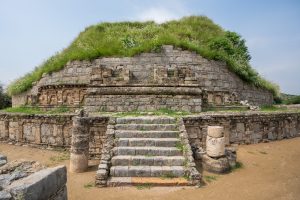
Overview:
Alas, it’s a long drive north… but it’ll be worth it, we swear! The drive is broken up into two days for your comfort and safety. Driving late at night is risky due to poor roads, and our driver needs to sleep, too!
Driving time depends on how often we stop, weather and road conditions, etc. The road is very bumpy and winding. If you have back problems or other issues with transportation, keep this in mind. We’ve tried to time the tours to avoid rains and landslides (the biggest delays), but you never know in the mountains.
Mountain scenery will entertain you on the way, and we’ll stop for a picnic lunch and chai whenever you feel like it.
Activities:
- Long driving
- Picnic lunch
- Travel time: 10 – 13 hours (via Naran), 12 – 15 hours (via Besham)
- Max Altitude: 1,265 metres
- Activities: driving, sightseeing
- Accommodation: Chilas hotel
- Transport: private van
- Meals: breakfast, lunch and dinner
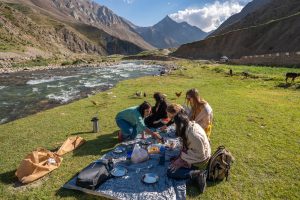
Overview:
Now we’re talking mountains! It’s another long day of driving—though less than the previous day—but we’ll be treated to such fantastic views by the end that your butt won’t notice. Almost.
One last hop in some colorful jeeps and we’ll touch down in Tarashing, a charming village at the foot of Nanga Parbat, 9th highest mountain in the world. Village views can’t get much better than this.
We’ll be tired from all the driving, so we’ll take it easy upon arrival.
Activities:
- Long driving
- Lunch in Astore
- Travel time: 4-5 hours
- Max Altitude: 2,900 metres
- Activities: driving, sightseeing
- Accommodation: Tarishing guest house
- Transport: private van, private jeep
- Meals: breakfast, lunch and dinner
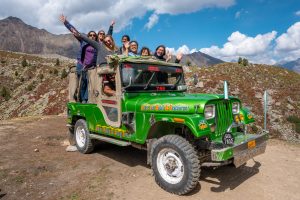
Overview:
You can walk around the village as much or as little as you want. Motivated souls can trek up a trek to a viewpoint overlooking Tarishing on one side, and Nanga Parbat and a glacier on the other.
Activities:
- Village walk through Tarishing
- Trek to view point
- Travel time: N/A
- Max Altitude: 2,900 metres
- Activities: sightseeing
- Accommodation: Tarishing guest house
- Transport: N/A
- Meals: breakfast, lunch and dinner
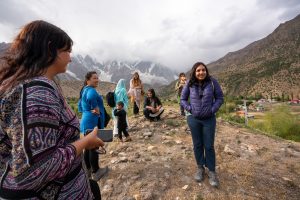
Overview:
Get yer trekking boots on, we’re going for a jaunt!
Weather permitting (it can be fickle in Astore) we’ll be trekking to Nanga Parbat base camp. The walk is gentle uphill, with only one steep slope near the end, and it takes you past several pretty villages. You’ll be rewarded with pastures, glaciers, and an even more epic view of Nanga Parbat.
It’s also possible to jeep most of the way to the base camp in fall season, with a short but steep two kilometer walk after. In fall, those who are motivated can trek the whole way, and eventually be joined by those who want to drive. Then, we can all drive back to Tarishing together… unless you feel like walking back!
Activities:
- Trek to Nanga Parbat base camp Rupal face
- Travel time: 1-2 hours
- Max Altitude: 3,655 metres
- Activities: 4-5 hour trek
- Accommodation: Tarishing guest house
- Transport: private jeep
- Meals: breakfast, lunch and dinner
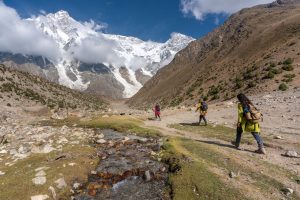
Overview:
No trip to Astore is complete without a visit to Rama Lake—we wouldn’t do that to you!
We’ll take jeeps from Tarishing village up to Rama Meadows, about one hour’s drive above Astore town.
In fall, the road will be clear. If you want to walk, the trek will take about 1 hour. If not, you can take a 20-minute jeep ride up to the lake.
After that we will start driving to our next destination, Hunza. We’ll break up the drive with photo stops at mountain viewpoints and lunch or chai at roadside shacks with the prettiest backgrounds you’ve ever seen. We’ll be staying at a traditional Hunzai guest house in the village of Gulmit in upper Hunza Valley.
Activities:
- Trek to Rama Lake (4 km/2.5 mi, time dependent on season)
- Long drive to Gulmit
- Photo stop at junction point of Karakoram, Hindu Kush, Himalaya mountain ranges
- Photo stop at Nanga parbat view point
- Photo stop at Rakaposhi viewpoint
- Travel time: 1-2 hours to Rama lake, 6-7 hours to Gulmit
- Max Altitude: 3,510 metres
- Activities: 1-2 hour trek
- Accommodation: Gulmit traditional guest house
- Transport: private van, private jeep
- Meals: breakfast, lunch and dinner
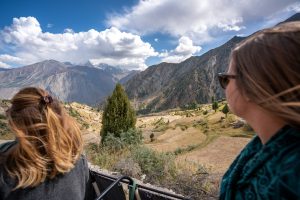
Overview:
Our first day in Gulmit is all about wandering around and getting a feel for this idyllic Hunzai village. Old stone and mud houses, winding dirt paths lined with trees, and both men and women out on the streets always ready with a smile and greeting—what better introduction to Pakistan’s north could you ask for?
The day will be distinctly female in flavor, with visits to both a women-run carpet center (great place for authentic souvenir shopping that directly supports local women) and a women-run cafe serving up all kinds of local Hunza food.
After that, it’s time to burn off some calories (necessary, at this point) by trekking up a dirt road to the mysterious ruins of Ondra Fort. Even locals don’t know exactly how old it is, but the views from the top are spectacular—you can see Gulmit, Attabad Lake, and the Passu Cones from the top—and it’s not every day you can have an entire ancient fortress to yourself!
After that we will drive to Attabad lake, one of the bluest lakes in Pakistan. If you promise not to kill everyone, you might be allowed to drive the boat across Attabad.
Activities:
- Women-run carpet weaving center
- Visit oldest house in Gulmit village
- Local lunch at women-run café
- Trek to Ondra Fort ruins for sunset (3km/1.8mi, 2 to 3 hours)
- Boating at Attabad lake
- Travel time: 30 minutes
- Max Altitude: 2,500 metres
- Activities: 2-3 hour trek
- Accommodation: Gulmit traditional guest house
- Transport: private van
- Meals: breakfast, lunch and dinner
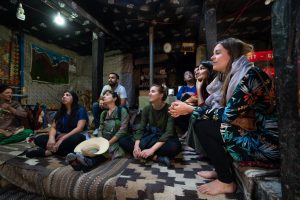
Overview:
Time to venture to one of the oldest and most picturesque villages in Hunza: Passu. Situated riverside near the feet of the famous Passu Cones, the village is a collection of cute stone houses, farm fields, and fruit trees.
After a filling lunch, we’ll head out for an afternoon trek between two suspension bridges: the Passu and Hussaini bridges. Perilous and nerve wracking even for the most confident adventurers, the bridges are a sight… and make for excellent bragging and/or Indiana Jones references for friends and family at home.
The trek between the two bridges isn’t too steep nor difficult by local standards, but it includes a long, gradual uphill.
Activities:
- Village walk in Passu
- Hussaini Bridge to Passu Bridge trek (8km/5mi, 3-5 hours)
- Travel time: 30 minutes
- Max Altitude: 2,500 metres
- Activities: 4-5 hour trek
- Accommodation: Gulmit traditional guest house
- Transport: private
- van
- Meals: breakfast, lunch and dinner
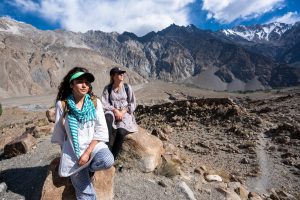
Overview:
Pakistan has more glacier coverage than any other country; it’s time to see one up close!
We’ll first walk up a series of dirt switchbacks to Borith Lake (2,600m), about 1.5km or a little less than 1 mile from the Karakoram Highway. Bold souls can go for a dip in its chilly waters—alas, you’ll have to keep all your clothes on because #modestlife—and we can all have chai at one of the guesthouses overlooking the little lake.
We’ll carry on with the relatively easy walk to the vantage point above the glacier, about one hour beyond Borith Lake. It’s sometimes possible to walk on the glacier. However, we only recommend this for the most fit participants, as the way down is extremely steep and loose.
Activities:
- Trek to Borith Lake, White Glacier (7km/4.4 mi, 2-3 hours)
- Travel time: 30 minutes
- Max Altitude: 2,600 metres
- Activities: 2-3 hour trek
- Accommodation: Gulmit traditional guest house
- Transport: private van
- Meals: breakfast, lunch and dinner
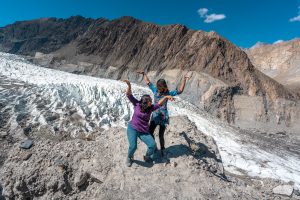
Overview:
As far as border crossings go, it doesn’t get much cooler than Khunjerab. Literally and figuratively.
The Khunjerab Pass between Pakistan and China is the highest paved border crossing in the world. It’s so high, there are oxygen machines in the border waiting area!
Obviously, we won’t be able to cross the border—unless you have a Chinese visa and want to run away from us—but we can drive through Khunjerab National Park to the border gate with China. It’s a long drive, but the road is good and the views, epic
Activities:
- Drive up to Khunjerab Pass
- Travel time: 5 hours round trip
- Max Altitude: 4,733 metres
- Activities: driving, sightseeing
- Accommodation: Gulmit traditional guest house
- Transport: private van
- Meals: breakfast, lunch and dinner
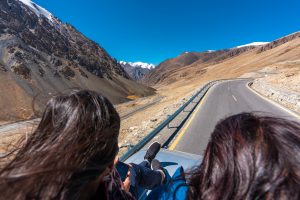
Overview:
When Pakistanis tell you “You must visit Hunza!!!”, this is where they’re talking about. By far the most popular place in Hunza (which actually stretches all the way to Khunjerab, but not many people realize that), Karimabad and Altit are as close to touristy as it gets in Pakistan.
We’ll divide our time between Karimabad, home to Baltit Fort, and Altit, where a fort of the same name is located. Beautifully restored by the Aga Khan Foundation, the forts are some of the best-maintained historical sites in Pakistan! In between fort visits we’ll hit the town for local food and shopping, and meet a local women’s empowerment organization. The view from Baltit Fort in Karimabad.
To finish the day off right, we’ll watch sunset at a place called the Eagle’s Nest, then drive down south to a town called Gilgit to rest our weary heads at a guest house.
Activities:
- Guided tour of Baltit Fort and Altit Fort
- Lunch at a women-run café
- Visit local women’s empowerment initiative
- Sunset at Eagle’s Nest
- Travel time: 45 minutes to Karimabad, 2 hours to Gilgit
- Max Altitude: 2,500 metres
- Activities: sightseeing, history
- Accommodation: Gilgit guest house
- Transport: private van
- Meals: breakfast, lunch and dinner
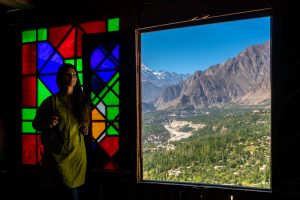
Overview:
Finally, the off the beaten track part of the tour can begin! Onwards to our favorite valley in Gilgit Baltistan: Yasin. Aside from serious trekkers and the occasional domestic tourist, few people visit Yasin. Here, we’ll trade towering Karakoram peaks for a narrower, more intimate mountain valley. Most importantly, we’ll meet some of the friendliest people in the region. Yes, even by Pakistan standards!
Your introduction to Yasin begins in Taus. The village is filled with trees and perched on a scenic spot overlooking the Yasin river, we can kick back and wander around for a bit.
In the afternoon, we’ll hike to the best view in Yasin: Muduri Fort. Though “fort” is a bit of a stretch—there’s only one wall left of the 19th century fort—the views from the hilltop ruins are unrivaled.
Activities:
- Village walk in Taus Trek to
- Trek to Muduri Fort for sunset
- Travel time: 4-5 hours
- Max Altitude: 2,750 metres
- Activities: cultural activities, sightseeing
- Accommodation: Taus homestay
- Transport: private van
- Meals: breakfast, lunch and dinner
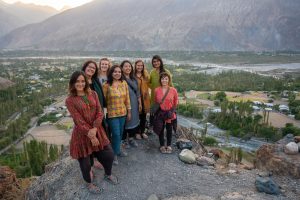
Overview:
We’ll have to change vehicles for the last two-hour stretch of rocky roads to Darkot village. Our journey ends at the home of an impossibly sweet local family.
Activities:
- Village walk through Darkot
- Travel time: 2-3 hours
- Max Altitude: 2,750 metres
- Activities: driving, sightseeing
- Accommodation: Darkot homestay
- Transport: jeep
- Meals: breakfast, lunch and dinner
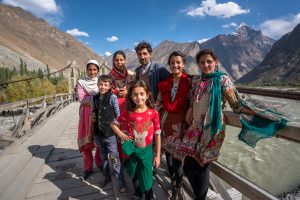
Overview:
With the assistance of our local family, we’ll do a day hike in the Darkot area. Weather conditions can complicate things, so if it’s too snowy we’ll do an easier trek. If you’re not up for an entire day of walking, you’re welcome to stay in Darkot and relax in the village instead.
Activities:
- Trekking around Darkot (7 km/4.5 mi, 2 – 3 hours)
- Travel time: N/A
- Max Altitude: 2,750 metres
- Activities: 2-3 hour trek
- Accommodation: Darkot homestay
- Transport: N/A
- Meals: breakfast, lunch and dinner
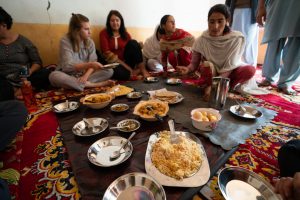
Overview:
Ack, a long driving day! It’ll be rough (leaving Yasin always is), but it will break down our long journey for the next day. Ew.
We’ll break up the drive with a scenic lunch somewhere, never fear.
Activities:
- Long driving day
- Travel time: 2-3 hours to Taus, 4-5 hours to Gilgit
- Max Altitude: 2,750 metres
- Activities: driving, sightseeing
- Accommodation: Gilgit Guest house
- Transport: private van, private jeep
- Meals: breakfast, lunch and dinner local kids playing music in Hunza
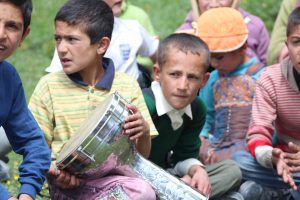
Overview:
Alas, all good things must come to an end, including our time in the mountains. We have to begin our journey back down south to Lahore!
Much like the drive up north, this day will be long. Prepare your podcasts and ready your snacks, we’ve got a drive ahead of us.
Activities:
- Long driving day
- Travel time: 9-10 hours
- Max Altitude: 1,500 metres
- Activities: driving, sightseeing
- Accommodation: Besham Hotel
- Transport: private van
- Meals: breakfast, lunch and dinner
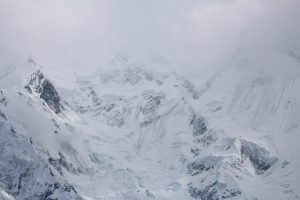
Overview:
We’re almost there! Don’t worry, we’ll make regular chai stops and try to find a pretty place for a picnic lunch to save us from going mental with boredom.
Activities:
- Long driving day
- Picnic lunch
- Travel time: 9-10 hours
- Max Altitude: 613 metres
- Activities: driving, sightseeing
- Accommodation: Besham Hotel
- Transport: private van
- Meals: breakfast, lunch and dinner
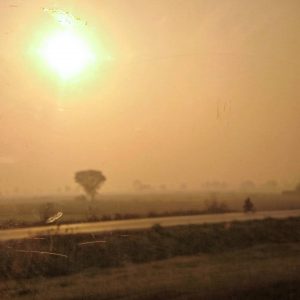
Overview:
They say if you haven’t seen Lahore you haven’t lived. We agree! Lahore is Pakistan’s cultural capital, brimming with things to do both historical and modern.
Of course, we’ll still be weary from the drive down. No need to rush to do everything on our first day here! We’ll take our time checking out some of the city’s lesser known sights, with a healthy dose of culinary exploration in between.
Activities:
- Bibi Pak Daman shrine
- Shalimar Gardens
- Mian Mir shrine
- Travel time: 1-2 hours
- Max Altitude: 217 metres
- Activities: cultural activities, sightseeing
- Accommodation: Lahore Hotel
- Transport: private van
- Meals: breakfast, lunch and dinner
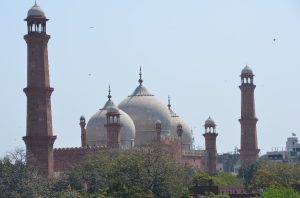
Overview:
On our final full day of tour, we’ll do a deep dive into Lahore’s Walled City.
We’ll begin with a typical desi nashta, local breakfast, right next to the fort. Lahoris go big with breakfasts, so afterward we’ll need to walk it all off as we roam through the old city. We’ll see centuries old mosques, an intricate Persian bathhouse, busy markets overflowing with colors and sounds… and then some!
After another delectable Lahori lunch—food is everything here—we’ll head towards the bizarre but bumpin’ Wagah Border ceremony. You can cheer on Pakistan as Pakistani and Indian border guards strut their stuff for the daily closing ceremony of the India-Pakistan border.
Finally, it’ll be time for our final family dinner with a view of Badshahi Mosque on Lahore’s most famous food street. Whether we’re sad the tour is ending or rejoicing in being free of each other, the food will be delicious and the view delectable.
Activities:
- Traditional breakfast
- Historic walk around the Walled City
- Lahore Fort
- Shahi Hamam
- Wazir Khan Mosque
- Badshahi Mosque
- Lahore food street
- Wagah Border ceremony
- Farewell dinner
- Travel time: 1-2 hours
- Max Altitude: 217 metres
- Activities: cultural activities, sightseeing
- Accommodation: Lahore Hotel
- Transport: private van
- Meals: breakfast, lunch and dinner
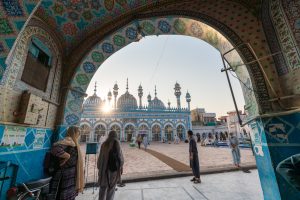
And so, ends our time together!
If you’re flying from Lahore, we’ll arrange an airport transfer for you. If you flying out of Islamabad, we can arrange an airport transfer from Lahore for you for an extra fee. Then it’s smooth flying for you all the way home!
For those who have a bit more holiday time available, we highly recommend spending a few more days in Lahore to explore the city on your own! You’ll be confident navigating the streets of Pakistan by then, and there’s far more to do in Lahore than just the places we’ll be visiting. Give it some thought!
Tour Details
Included
- Transportation with experienced driver: Private van and jeeps within Pakistan
- Accommodation for the duration of the tour (Double Occupancy at hotels / shared accommodation in homestays)
- Accommodation around tour dates can be arranged for an extra cost
- Meals (Breakfast, lunch and dinner)
- Guided tours
- Cultural activities
- Entrance fees
- Tolls and taxes
- Basic first aid
- Letter of Invitation (LOI) for visa
- Airport transfers within Pakistan
Not Included
- Flight tickets
- Visa fees
- Porters for carrying personal equipment
- Personal trekking equipment
- Tips for guides/workers (optional)
- Snacks while trekking and traveling
- Extra meals/laundry services availed at hotels or otherwise
- Charges of sports activities
- Souvenirs
- Shopping or any other expenses of personal nature
- Insurance liability, medical aid, and helicopter rescue coverage
- Any other services not mentioned in the plan
Tour add-ons
Standard package includes accommodation on double occupancy. Additional charges for:
- Single Occupancy: USD 700 per head
Note: Arrangement of room on single occupancy at homestays is subject to availability.
General Information
Why you should travel to Pakistan ASAP?
There’s no better time to travel to Pakistan. The security situation has improved immensely. Foreign tourists are returning. The government is relaxing travel restrictions.
In a few years, Pakistan is going to be on far more travelers’ maps. Now is the time to come and experience it for yourself… before everyone else figures out how amazing it is.
“I can’t think of anyone better to have shown us around Pakistan than you two.” Ingrid, USA
Why this Tour?
This is a tour made for female travelers by female travelers. Both Aneeqa and Alex have traveled all over Pakistan independently and otherwise; you won’t find many women working in Pakistan’s travelsphere with more experience than us. To quote one of our tour guests: we’re “badass motherfuckers”.
Though rich, our experiences have proven Pakistan isn’t an easy place to travel as a woman. Nevertheless, we love the country, and want more women to travel Pakistan. This Pakistan women’s tour is meant to help more female travelers come and experience a positive side of the country, and normalize the idea of women traveling without men there (it’s still unusual!).
We also designed this tour with responsible tourism in mind. On this tour, we will…
- Stay in local homestays and guesthouses instead of international chains.
- Eat local, seasonal food as often as possible.
- Travel to more offbeat locations to distribute our tourist money.
- Use locals instead of outsiders as guides, and hire female guides where possible.
- Visit women-run initiatives and shop at women-run businesses.
- Reduce our waste by filtering water instead of buying single-use bottles, carrying reusable shopping bags, and using reusable boxes and eating utensils for packed lunches.
- Pay all drivers, guides, and hosts a fair wage for their time.
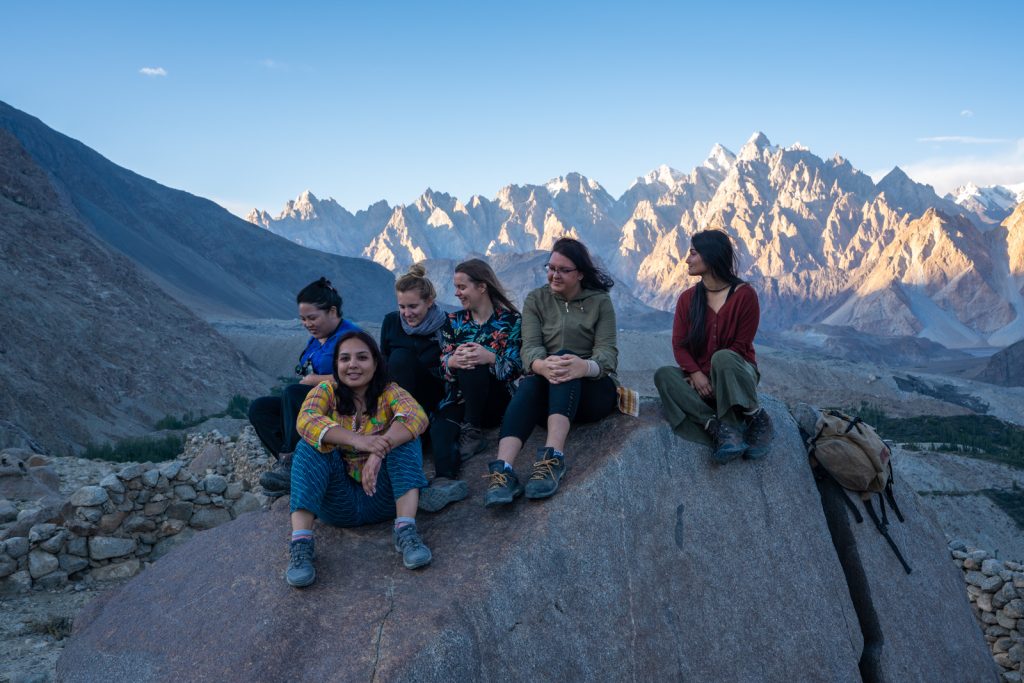
Frequently asked questions about our Women Tour
To keep things intimate and encourage local interactions we’re capping the number at 10 women.
We’ll ask you a few questions before giving you a spot on a tour. Don’t take it personally; we want to make sure everyone is on the same page since the group is small.
The tour cost is USD 2,500 per person. A deposit of USD 500 is required to secure your position on the tour. Remaining payment has to be cleared before departure.
Note: If this cost seems too high to you, know it’s priced for a reason. We’re not racing to the bottom like other tour operators in Pakistan—this is what a unique, responsible, small group tour costs.
If you need to cancel your tour for some reason, our cancellation policy is:
- Cancel more than 2 months in advance: Full refund minus deposit
- 1-2 months in advance: 50% refund minus deposit
- Less than one month in advance: 25% refund minus deposit
- Less than two weeks in advance: Too last minute! No refunds.
Coronavirus cancellation policy
No one can really predict what will happen with coronavirus affecting everyone’s travel plans. We already had to cancel several tours due to the COVID-19 pandemic.
We understand that travel plans can change in the blink of an eye in times like these, so we offer the following cancellation policy for coronavirus-related issues:
- If we cancel the trip at any time: Full refund minus $100 to cover our time, transfer fees, and any vendor payments we might have made already.
- If you cancel your trip due to coronavirus concerns at any time but we still run the trip: Full refund minus deposit
- If you test positive before your flight and can’t come: You can move your payment minus the deposit to a future tour.
You’re fascinated by culture and thirsty for adventure. If things don’t go according to plan, that’s okay: you’re flexible, and like the challenge of the unexpected. You don’t mind roughing it a bit, and aren’t intimidated by squat toilets or no electricity. Mountains thrill you and cultures intrigue you. Meeting locals and getting a feel for a place is more important than getting a perfect Instagram shot and ticking a million bucket list items.
If this sounds like you, this tour is made for you! Sign up now before spots run out.
If you need luxury and comforts of home while traveling, or want to travel as fast as possible, this tour isn’t the best choice for you.
Wifi, mobile data, and electricity aren’t always available. You’ll have to use (sometimes disturbing) squat toilets every once in a while. Local foods comprise the majority of our diets unless you have restrictions. Accommodations in remote areas can be basic at best. We’ll be exploring at a relaxed pace; we’re not trying to see every. single. sight. in Hunza in one day.
Sounds like a nightmare? You might want to pass on this tour.
Most adventures require some comfort sacrifices, but we’ll do our best to make sure you’re taken care of despite occasionally basic infrastructure.
Infrastructure is basic. Running hot water is not always available in the mountains. Some accommodation will only have bucket showers (bucket of water and something to pour it on you). Squat toilets are common, toilet paper is not common. These are part of the challenges of traveling in a developing country! Keep an open mind (and always have hand sanitizer ready) and you’ll be okay.
Accommodation includes hotels, guesthouses, and traditional homestays. You’ll have to share double rooms in hotels and guesthouses. In homestays we sometimes have to share one common sleeping space (how local people sleep).
Connectivity is limited at times. Though cities have decent signal and wifi, mobile signals in Gilgit Baltistan territory are wretched at best. Wifi is slow (if even available) and many areas have no signal. We’ll arrange local SIM cards for you if desired, but overall don’t count on Skyping home or uploading videos unless we’re in a city.
Hygiene standards can be poor in Pakistan. Our chosen hotels and guesthouses have clean facilities, but when we’re out on the road we’ll encounter restrooms in sometimes terrifying states. Food is often problematic, and upset stomachs are inevitable. We’ll do our best to find clean food and help anyone who falls ill; just know it’s a common side effect of traveling here.
Electricity is not available 24/7 in the mountains. Many places only have electricity for a few hours each day. Some establishments have generators to provide electricity, but they don’t run all day. Heating in remote areas is sometimes limited to wood stoves rather than electric heating. A power bank for small devices is useful (charge it before we leave the city!). We’ll make sure you have access to outlets when electricity is available.
Roads are long and bumpy, particularly on the 20+ hour drive up to Gilgit Baltistan and in remote valleys. We’ll use jeeps to reach some locations. Landslides often cause unexpected delays in the mountains. Prepare yourself for hours of bumpy rides, and know that plans may sometimes be altered due to road delays.
Day trekking is part of our tour. You need to be fit enough to walk for hours at a time. We won’t be doing anything extreme—we’re not fit enough to trek to K2 Basecamp, either!—but you should be fit enough to walk on uneven paths in the mountains for several hours. With breaks, of course.
Lahore and Islamabad can be warm (up to 20-30°C), while mountains will be cold (sometimes 10-15°C during the day and below freezing at night). Pack warm layers.
Laundry services are offered by some hotels, but aren’t something you can always count on. You’ll be able to wash clothes in sinks or buckets and hang them out to dry when we’re in the mountains.
Men are intense in Pakistan. Streets are predominantly a man’s world; many local women stay inside unless they have to go out for errands, school, or work. You’ll be stared at because you’re foreign, because we’re a group of women walking around, because people generally love staring, etc. It’s an inescapable part of traveling Pakistan… ignore them. The further north we go, the less intense the staring and scrutiny will be.
Reviews
